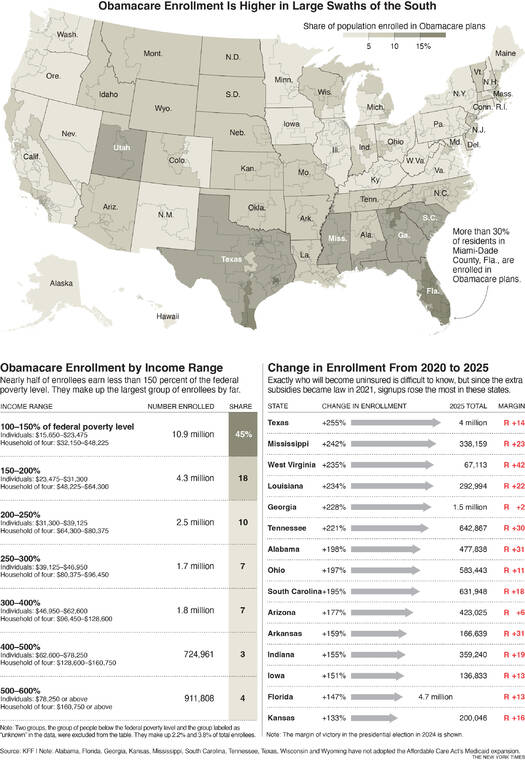More than 23 million Americans currently enrolled in Affordable Care Act (ACA) plans are at risk of facing higher health care costs next year if federal funding for subsidies expires as scheduled on December 31, 2023. Congressional Democrats are withholding their votes on a government spending bill to pressure Republicans into extending these crucial subsidies, which help lower insurance costs for individuals purchasing coverage through ACA marketplaces.
Since the introduction of additional federal funding in 2021, enrollment in ACA plans has more than doubled. This increase is significant in several states, particularly those with Republican leadership that have opted not to expand their Medicaid programs for low-income, childless adults. Approximately 57% of individuals relying on these subsidies reside in Republican congressional districts.
The situation is especially pronounced in states that have not expanded Medicaid since the ACA encouraged such expansions in 2014. The ACA initially aimed to cover the poorest Americans through Medicaid while providing subsidies for those with slightly higher incomes. This overlap means that many low-income individuals in states without broad Medicaid access qualify for subsidies, which has led to substantial enrollment growth in six red states: Texas, Louisiana, Mississippi, Tennessee, Georgia, and West Virginia. Notably, West Virginia and Louisiana have opted to expand their Medicaid programs.
In regions such as South Florida, the ACA has significantly impacted low-wage workers and early retirees, resulting in a high concentration of enrollees. Many congressional districts with the highest ACA enrollment are located in states that Donald Trump won during the presidential election, although not all are represented by Republican lawmakers.
A substantial portion of enrollees earn less than 150% of the federal poverty level—approximately $24,000 for an individual or $48,000 for a family of four. These individuals often work in low-wage positions without employer-sponsored health insurance, are part-time workers, or are freelancers engaged in gig economy work. For this demographic, the extra subsidies have been particularly beneficial; if they select one of the two lowest-cost plans available, they can avoid monthly premium payments entirely.
Despite these advantages, critics argue that the generous nature of the subsidies has led to instances of fraud. If the subsidies are allowed to expire, enrollees may see their monthly premium costs rise significantly, ranging from $27 to $82. The potential financial impact of these changes underscores the urgency for Congress to act on extending the subsidies before the end of the year.
